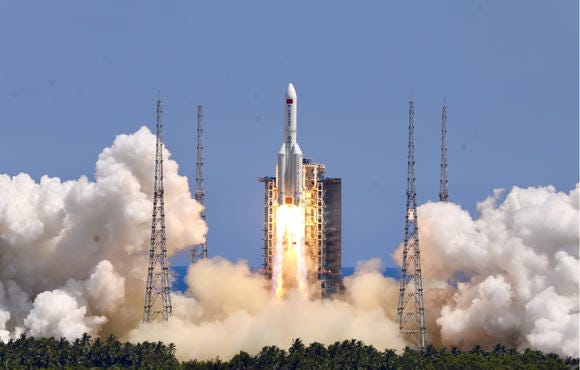Exploring China's Tiangong Space Station and U.S. Security Concerns
Written on
Chapter 1: Launch of the Wentian Space Laboratory
On July 24th, China successfully launched its Wentian space laboratory, marking a significant milestone as the largest spacecraft the nation has ever deployed into Earth's orbit. This launch brings the Tiangong space station closer to its final configuration. Following the docking of Wentian with the Tianhe core module of the Tiangong station, the crew aboard Shenzhou XIV will enter the new laboratory to evaluate its international equipment and overall functionality.
The Wentian laboratory will be the first scientific module of the Tiangong station, equipped with advanced technologies enabling the China Manned Space Program to perform a variety of scientific experiments in microgravity. Although the Tiangong Space Station, upon completion, will be similar in size to the now-retired Russian Mir space station, it will only be about one-fifth the size of the International Space Station. Nevertheless, this project represents a significant advancement for China's aspirations in long-term space habitation.
Numerous research initiatives will take place aboard the station, focusing on spacecraft docking technology, enhancing human operations for potential permanent stays in orbit, and developing regenerative life support systems, among other scientific pursuits.

Section 1.1: Implications for U.S. National Security
Despite the scientific advancements, U.S. intelligence assessments view the development of the Tiangong Space Station with concern. They suggest that it signifies China's endeavor to "match or exceed U.S. capabilities in space," aiming to reap military, economic, and prestige benefits similar to those achieved by Washington through its leadership in space exploration. Some analysts interpret these developments as part of a "new space race," which could pose risks to U.S. national security. Echoing these sentiments, a NASA administrator has previously expressed concerns regarding China's lunar ambitions.
Subsection 1.1.1: Further Reading on Space Exploration
Want to delve deeper into space exploration and the historical space race? Explore these recommended books!
This publication features affiliate links to books that cover topics related to space exploration and the initial space race. If you decide to purchase through these links, you'll be supporting my writing and research efforts at no extra cost to you.
Chapter 2: The Strategic Landscape of Space
The first video titled "China Takes Chip War To Advance Tiangong Space Station" discusses the intersection of technology and space exploration in the context of China's ambitions and strategic maneuvers.
The second video, "10 Years of the Wolf Amendment: Assessing Effects and Outcomes," evaluates the implications of U.S. legislative measures on space cooperation and competition, particularly concerning China.